North Carolina War Between the States Sesquicentennial
Memorials to North Carolina's Defenders
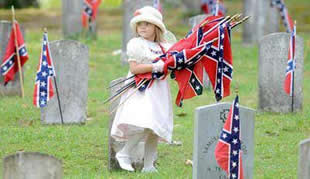
The following is excerpted from an address by John W. Ellis presented in the late 1850s,
extolling the patriotic virtue of those who had given their lives in defense of the Old North State,
and whose precioius legacy was defended with the call to arms in May of 1861:
“The Dead of North-Carolina” by John W. Ellis of North Carolina
“They have reared to themselves a monument that mocks the regal splendor of marble,
and the durability of perennial brass. That monument is the soil that gave us birth, and the liberties
that surround our lives; the political privileges we enjoy, and this edifice to God, at whose altars
we are permitted to bow with freedom of conscience and devotion.
It rises from the earth round and about us, till its summit is lost in the heavens; and there it will
stand till the reign of reason is debased and overthrown, and the slaves grovels
where now the freeman stands.
To whom can I appeal with more propriety than the freemen of Mecklenburgh, to know when,
if ever, that day shall come? Truly, standing here as I do, at the end of seventy-three years
of experience, -- when I see rising star after star in rapid succession, and increasing brilliancy,
in that sky of my country’s glory, where once it was all dark, -- when I look upon this assembly,
advancing in all the virtues that adorn a Christian people, and see them preserving the
original gifts of liberty with the freshness or morning, I am prompted to exclaim, Never!
Never shall that hour come! No! Not until the bountiful heavens shall melt from above our heads,
and the earth pass from under our feet; till nature gives signs of decay, and the “sun shall
slumber in the clouds, forgetful of the voice of the morning.”
“When earth’s cities have no sound or tread,
And ships are drifting with the dead,
To shores where all is dumb.”
Till when, ever as our own Yadkin and Catawba roll their currents to the mighty ocean,
the rippling song of their waters will be blended with the anthems of freemen, swelling with
the praises of the past, the blessings of the present, and the prospects of the future!”
(North Carolina Reader, Number III, C.H. Wiley, A.S. Barnes & Burr, 1860, pp 280-281)
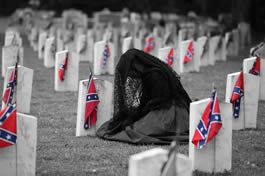
"Obeying the First Law of Nature".....
"No man volunteered to fight for the Confederacy who was not prompted to do so by the
most natural and the most powerful incentives that can influence human conduct. Each and every
of them felt that, whether personally responsible for bringing on the dreadful issue or not, in shouldering
his gun to meet it, he was defending not only his heritage of liberty, but his home and property from
the lawless hand of the invader, who sought to subjugate them to his will -- that he was obeying the
first law of nature, and was therefore justified in the sight of God and man."
Hon. A.M. Waddell of Wilmington, formerly Lieutenant-Colonel, CSA.
(An Address Before the Association Army of Northern Virginia, October 28, 1887)
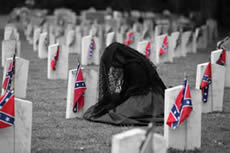
Gravestone inscription in Fayetteville, North Carolina’s Cross Creek Cemetery.
"To perpetuate the memory of Marion, son of John and Ellen Smith, born at Raleigh, October 25, 1841;
died, Malvern Hill, July 1, 1862. First Sergeant, Company K, Raleigh Rifles, 14th North Carolina Regiment.
He fell mortally wounded while in front of his command, gallantly charging. His last words were:
"Press on my brave boys and follow up our glorious victory, dont wait for me!"
“O glorious flag, O righteous cause,
O glorious struggle to be free,
O glorious sleeper, thou hast proved,
A soldier fit to follow Lee.”
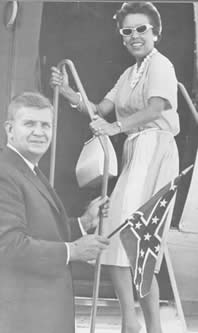
Governor & Mrs. Terry Sanford Honor North Carolina's
soldiers During the 1961 Centennial Observance
“The Southern people, weary of discord, exercised every means to remain in the Union of States;
North Carolina was the last of the States to secede, using every honorable recourse to remain,
finally accepting war and rightly joined her Sister States in forming The Confederate States of America.
“The triumphs of MIGHT are transient — they pass and are forgotten —
the Sufferings of RIGHT are graven deepest in the chronicles of Nations.”
Their righteous cause, their deeds and valor, shall ever go down to posterity, without varying,
their righteousness shall ever be—“A Just Cause.”
Col. William Lord DeRosset

Seeds of Hatred Sown at Arlington
"The seed [of hate] that had been planted produced its harvest. In the Antietam cemetery it was an issue
whether the Confederate dead deserved decent burial. Sanitary conditions ended the discussion by compelling
internment of “skeletons, rooted up by hogs, and blanching in open fields.” So when Memorial Day was observed
in Arlington Cemetery the hatred of righteousness was in command. Soldiers in Federal blue were stationed
around the graves of Confederate dead to prevent flowers being placed upon them.”
(The Road to Reunion, Paul H. Buck, page 15)
"Two of Seven Wounds"
British Traveler David MacRae on the Postwar South:
"Evidence was everywhere that the South had maintained the desperate conflict until she was utterly exhausted.
At its outbreak she had poured her best men into the field. Almost every man I met at the South, and especially
in North Carolina, Georgia and Virginia, seemed to have been in the army; and it was painful to find how many
even of those who had returned were mutilated, maimed or broken in health by exposure.
When I remarked this to a young Confederate officer in North Carolina, and said that I was glad to see that he
had escaped unhurt, he said, “Wait ‘til we get to the office, sir, and I will tell you more about that.” When we got there,
he pulled up one leg of his trousers, and showed me that he had an iron rod there to strengthen his limb, and
enable him to walk without limping, half of his foot being off. He showed me on the other leg a deep scar made
by the fragment of a shell; and these were but two of seven wounds which had left their marks upon his body.
When he heard me speak of relics, he said,
“Try to find a North Carolina gentleman without a Yankee mark on him”
(Exhaustion of the South, David MacRae, page 345)
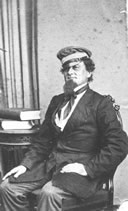
Captain John Newland Maffitt, Memorial Day Address, 10 May 1879
"The day is approaching when an unprejudiced historian, with the devoted perseverance of a St. Jerome,
will produce for the world's information and admiration a faithful record of our gigantic struggle, in which link after
link, now buried, will start into life, until the illuminated whole shall put to shame our defamers. Then will be illustrated,
beyond a peradventure, our paucity of numbers against multitudinous armies---the poverty of a Government sustained
by ragged and half-starved troops, whose splendid loyalty never wavered, and whose courage embraced the
extreme point of martial daring.
The cause defended was that of self-government and constitutional liberty. Statesmen have grasped
the fundamental principles which, from the mere attrition of our armies, fell with their standard, and in
the legislative halls of our country they are making a glorious effort for the preservation of the heritage
bequeathed to us in 1787. The cry from the North was the Union! The Union!---but they manifested naught
save contempt for the Constitution that sealed and sanctified that Union.
Beginning with contempt, they would end with an utter disregard for its teachings, and if permitted,
would entirely subvert it. We must not close our eyes to the vital importance of the present struggle---a struggle
with the hope of rescuing the palladium of our liberties from the desecrating hand of selfish partisanship.
We cannot sit idly by, mute and uninterested spectators. We must cheer the faint heart and strengthen
the feeble knees and make straight paths for our feet, or while we yet sleep the enemy will sow tares among
our sheaves of wheat. We live in times that call for wisdom in contemplation and virtue in action; but in which
virtue and wisdom will not do without resolution."
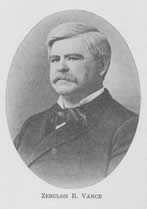
Tribute to Governor Zebulon Vance
"While mastering the difficulties of politics and harmonizing contending factions, he did not forget
the needs of the soldiers, nor the people, nor the destitute families of the deserters. His ships defied
the blockade and brought into our ports from England rifles, munitions, clothing, shoes and blankets
for the Army, necessities and comforts for all of the homes of the rich and poor. Our soldiers were
better provided for than any in the South. He is known to history as 'The great war governor.'
"After the carnage of battle, after the wreck and desolation of war, the night of reconstruction set in.
North Carolina's wounds had healed, but her heart was bleeding. All the beasts of prey came forth to
plunder and to devour. Darkness and desolation prevailed. There were many who thought that we should
seek admission to the Union in humility and contrition, that we should accept the new order, that we
should join the dominant party with its dogmas of social and political equality, that we should submit to
the disenfranchisement of the foremost and the bravest, and not cry aloud against the control
of elections by Federal soldiers.
"Many of these men were strong men. They thought that further contention with a victorious party was hopeless,
and would be disastrous. But there were those who stood for the integrity of the State as a member of the Union,
who did not surrender their ideals...who knew that the policies of reconstruction were impossible, except to
our shame and ruin. Vance was the leader, the voice of these, the inspiration of a State that was crushed. In a
speech in Raleigh at the beginning of this era of chaos, referring to the men who were advocating the policies
that in his opinion would bring ruin to the State, humiliation to the people and threaten the overthrow of
our civilization, after pouring upon them his ridicule and invective, as with the blast of a tempest he said:
'It shall be more tolerable for Sodom and Gomorrah in the day of judgment than for them in North Carolina.'
He made good the prophesy."
(Statue of Zebulon Baird Vance, Proceedings in Statuary Hall of the United States Capitol, Sixty-Fourth Congress,1917)
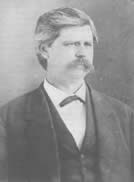
Vance: None But American Citizens Could Have Done These Things
"I would as soon believe...that every soldier in the Army of the Potomac, from its general to its
humblest private that followed its banners, did not, in his heart, respect and honor the lofty courage,
consummate skill, and patient constantcy of "that other army," which, although vastly inferior in numbers
and appointments, yet kept it four years on the short but bloody journey from the Potomac to the James,
and piled every inch of its pathway with ghastly monuments of the slain!
Let not the sneer of the supercilious, nor the taunt of the ungenerous over our final defeat deceive us
in this matter, or cause us to abate one jot of our just claims to the high place in history which posterity
will award us. Years hence when, as I trust, time and a (more just) policy shall have healed many an ugly
wound and quieted many an aching heart, the story of the great civil war will be read around a thousand
firesides among the homes of the North, and as the glowing recital burns upon the ear, how that one-fourth
of the people of the United States, without manufactures and almost without arms, without ships, arsenals or
foundries, shut out from all the world by a sealed blockade, for four long and terrible years fought back and
kept at bay the other three-fourths, who were aided by manumitted slaves, who had great navies, their
own and the workshops of the world at their control, and whose slaughtered armies were filled up again
and again from the swarming populations of Europe; struggled with the great armies of McClellan and
Grant, Sherman and Sheridan, and Buell, until the world was full of their fame;
A thousand fathers, burning with the unconfessed pride of country and of race, will say to their sons who
wonder how all this could have been: "They were the countrymen of Washington and Jackson. These were
Americans---none but American citizens could have done these things!"
(Address to the Literary Societies of the University of North Carolina by Ex-Governor Zebulon Vance, June 7, 1866)
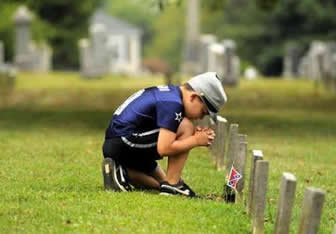
A Gallant North Carolinian:
[United Confederate Veterans] General William L. DeRosset, Wilmington, North Carolina, writes of
Colonel Parsley, whose widow is so zealous in the cause of the Daughters of the Confederacy:
“My old friend and comrade, William M. Parsley was one of four sons of a prominent citizen of this town, who
did much toward equipping companies organized here. He went into service as Captain of Company F,
Third North Carolina Infantry, was several times wounded but not seriously, and gradually rose by promotion
to be Lieutenant-Colonel of his Regiment. He was killed the day before the surrender at Appomattox.
After peace was declared his remains were brought home and lie in our beautiful Oakdale Cemetery. It was
on the occasion of a meeting of his brother officers for the purpose of arranging to receive the remains, that it
was determined to perfect a permanent organization of the officers, and hence grew the Association of
Officers of that regiment, later, after admitting the enlisted men, known as the Third North Carolina
Infantry Association, and it is doubtless the oldest organization of its kind in the United States.
They have met every year, regularly, on May 16 since 1866.
Colonel Parsley was particularly careful as to the comfort of his men, and was beloved by them, and
always enjoyed the esteem of his brother officers. Mrs. Parsley has always been one of the
most devoted members of the Ladies Memorial Association, and earnest in her endeavor
to organize the Sons of Confederate Veterans.
(Confederate Veteran Magazine, December 1895, page 379)
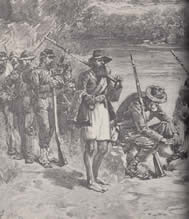
North Carolina Guns at Appomattox:
“The most pathetic, the most tragic, the most heroic, the grandest figure of all the ages is the Confederate
soldier at Appomattox. Over his vision comes the scene of the smouldering ruins of his boyhood home. His land
is drenched in blood. An old widowed mother weeps for his father who gave his life for a lost cause
and prays for her son’s return.
A pallid and sickened wife, over-wrought and over-worked struggles in vain for bread, the hunger-cry
of his starving children maddens his brain, the shot-torn, lifeless form of his brother lies piled unburied
in the trenches behind him; half-starved, half-naked, foot-sore and emaciated he stands.
A far-away look is on his face, tears furrow his powder-stained, dusty cheeks, but there is the light of battle
in his eye, the fire of a great unconquerable principle within his heart. Resolute and undaunted, he turns
about and with bitter protests at being surrendered, begs his old commander to lead him back into battle,
back to the field of blood and death: pleading he stands as the life-blood of the Confederacy ebbs away
in the smoke of the North Carolina guns at Appomattox.
To the Confederate soldier North Carolina has erected a great monument in the Capitol Square at Raleigh.
The State has also placed a monument at Appomattox which bears on the north side this inscription:
“Last at Appomattox.
At this place the North Carolina Brigade of Brigadier-General W.R. Cox of Grimes’ Division Fired the Last Volley,
9 April, 1865. Major-General Bryan Grimes of North Carolina Planned the Last Battle Fought by the
Army of Northern Virginia and Commanded the Infantry Engaged Therein, the Greater Part of Whom
Were North Carolinians.
This Stone is Erected by the Authority of the General Assembly of North Carolina, In Grateful and
Perpetual Memory of the Valor, Endurance, and Patriotism of Her Sons Who Followed With
Unshaken Fidelity the Fortunes of the Confederacy to This Closing Scene, Faithful to the End.
Erected 9 April, 1905”
(Minutes of the Tenth Annual Meeting of the State Literary & Historical Association, Nov. 4, 1909,
Compiled by Clarence H. Poe, Secretary-Treasurer, Mutual Publishing, 1909, page 61)
“Rebels”
“The application of the term “rebel” to Confederates is a very grave error, destructive of the hope of establishing
the South’s just claims to being the constitutional party, involving the right of secession, and in consequence
acknowledging the right of coercion. It makes the sending of troops into the South a constitutional act, which Lincoln
tried by sophistry to prove, but which has been disproved by all who earnestly seek reason and truth.
The common saying, “Washington was a rebel, and we are rebels too,” is a very grave error, and will be readily so
recognized if we consider the distinctive differences between the Revolutionary War and the war of the States.
I will remark, parenthetically, that my ancestors were not Tories, but fought, like Washington,
to overthrow monarchical rule.
The Revolutionary war was a war between colonists and their mother country; the other war
(the war between the States) was a war between citizens of coequal States. One was a rebellion of
subjects against an established monarchy: the other was the resistance of free, sovereign and independent
States to the encroachment of their common agent – the general government – the resistance of the creator
to the creature.
The fact that the enemy applies to us the term “rebels” should be of itself sufficient to cause us to regard the term
as intended by them one of opprobrium. They know full well that it is only by asserting that we were rebels that
they can, in the least, be justified in an unholy war.
The fame of the Northern soldier is of physical force; the glory of the Southern soldier is of moral courage.
The reputation of the Northern soldier rests upon numerical strength; the renown of the Southern soldier is based
upon unexcelled skill and fortitude. One sought conquest; the other, justice. One drew the sword in vengeful hate;
the other, without hatred or malice.
One climbed to the height of worldly success; the other, attained the summit of lofty virtue. One triumphed;
the other lost, but with his face to the foe and his eye toward heaven. His was the defeat of the vanquished patriot –
no broken faith, but a broken heart; his soul spotless, but his body scarred; his worldly inheritance seized,
destroyed, but the priceless wealth of a clear conscience was still his own.
Ashes marked the spot of his once peaceful home, but on the dismal scene he an altar to his country raised.
And around that altar we, the daughters of the Southland, in reverent devotion gather, feeding its dimly burning
light with ardent love, and filling the memory-haunted scene with the triumphant refrain:
“The body may to the sword fall victim, but truth can never know of death, and yet it will rise and weave into the
tapestry of the world’s most honored the words, “Men of the Confederacy.”
(Miss A. Dunovant, Historic Southern Monuments, Mrs. B.A.C. Emerson, editor, Neale Publishing, 1911, pp. 92-93)
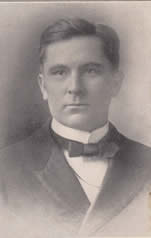
Governor Locke Craig
The Legacy of the Confederacy:
(Governor Locke Craig, accepting the Monument to the Women of the Confederacy,
unveiled at Raleigh, June 10, 1914)
“The State accepts this monument with grateful appreciation. It is the tribute of a knightly soldier to the
Women of the Confederacy. The statue is epic: Arms and the Man. Its theme is heroism and devotion;
the inheritance of the children of the South. To the earnest beholder, the statue is illumined with unfolding
meaning. His vision will determine its revelation.
As we look upon it, there rises out of the past a time when the spirit of war moved upon the depths of
human thought, and summoned the elemental forces to titanic strife. We feel the throes of the mighty
upheaval. We see “the marshaling in arms, and battle’s magnificently stern array.” Lovers say good-bye with
tokens of plighted troth; the young mother and the father in uniform, kneel together, weeping over the cradle
of their new born babe; there are tears and everlasting farewells; the cavalcades are filing off; the tramp of
innumerable armies is heard. In secret the mother – this Woman of the Confederacy – prays and weeps with
breaking heart for the boy who marches away to the wild, grand music of the bugles.
At home alone, the wives and mothers, these Women of the Confederacy, in patience and suffering, are
listening for the coming of those who will never return – will never return, but march on forever in the militant
hosts of the heroic of all kindred and nations, that have redeemed and glorified the world.
We dedicate this monument as a symbol of our veneration. We dedicate this monument as a covenant that
we too, in blessed remembrance of them, shall strive for fidelity and courage.
That people survives, gathers strength, becomes puissant in human destiny that has the faith and the courage
for the supreme issue. The immediate result is not the final judgment. Who won at Thermopylae, the Persians
or the Spartans? Who was victorious at the Alamo, Santa Anna or Travis? Who triumphed, Socrates or his
judges; Jesus or Pontius Pilate?
The glory of France is the Old Guard at Waterloo. The noblest feelings of the English heart are stirred
by the Light Brigade charging to death at Balaklava. Lexington and Guilford Courthouse are as dear to us
as Trenton and Yorktown.
Disaster does not always destroy. Armies may be destroyed, “Far called, our navies melt away”; yet from a
land consecrated by the blood of the brave, from a soil enriched by glorious tradition, tried and purified by fire,
a nobler, stronger race will come. Upon a land blighted by the cowardice of those who should defend it,
there is the judgment of decay and death.
The heroic past is our priceless inheritance. Our armies were destroyed; our land was smitten by war; our homes
were ravaged by avenging armies. We were plundered by the hordes of reconstruction. But standing in this land that
has suffered, amid this throng of grey-haired veterans, and their kindred and descendants, I declare that the legacy
of the war is our richest possession.
I utter the sentiments of every maimed soldier; of every soldier who gave the best of his young life to
“the storm-cradled nation that fell,” of every bereaved widow and mother; and if I could speak for the dead,
I would utter the sentiment of the forty thousand sons of the State who fell upon the fields of battle, when I declare
that they would not revoke that sacrifice.
Some of you can remember when the young soldier was brought home dead when the maiden was clothed
in her first sorrow, and the old gray head was bowed in the last grief. The mothers of the South had sent their
sons to the front as the Spartan mother when she delivered the shield to her son with the command:
“Return with it or upon it.”
They wept in silent desolation, but in their grief there was exaltation, for they knew that their sons had done
a soldier’s part, that in the tumult of historic days they had fought and fallen beneath the advancing flag; that
in strange lands, wounded and neglected, they had suffered without complaint, and bequeathing a message
for home, had died, as conquerors, without a murmur.
Hail to you, Women of the Confederacy, that bore them and nurtured them, and offered them for sacrifice!
In you and in your descendants is vouchsafed the promise to Abraham: Henceforth all generations shall call you blessed.
From the shadow of war we sweep into the grander day. The earth is hallowed because it is the sepulcher of
the brave; not men whose victories have been inscribed upon triumphal columns, but men whose memorial is,
that in courage and loyalty for conviction, they were steadfast unto death; men who have been stoned and
scourged, and quailed not before the mighty. “Their heroic sufferings rise up melodiously together to Heaven out
of all lands and out of all times, as a sacred Miserere; their heroic actions as a boundless everlasting
Psalm of Triumph.” They are the conquerors. The South has forever a part in that chorus of victory.”
(Memoirs and Speeches of Locke Craig, Governor of North Carolina 1913-1917, A History Political and Otherwise,
May F. Jones, editor, Hackney & Moale Company, 1923)
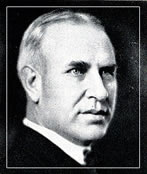
North Carolina Governor Welcomes Confederate Veterans to Charlotte, 1929
“In his address of welcome to the United Confederate Veterans, in reunion at Charlotte, N.C.,
Gov. O. Max Gardner told the story of the rebuilding of the South by its own men and women, saying:
“This is a proud day for North Carolina. This occasion has deeply touched the hearts of our people.
I, therefore, speaking in the name of my people, bring you more than their word of welcome; I bring you
assurance of their love and devotion. For more than sixty years you have been fighting gallantly with us and for us.
You have sacrificed much and risked all. Your lives have been an inspiration to our children and a benediction upon
our efforts to rebuild that which was destroyed by war. We not only, in gratitude, welcome you, but in proud affection
we here to-day claim you for our own.
Sixty years ago, the South was beaten and prostrate. Our material wealth had been consumed or destroyed;
most of our men had been killed or incapacitated in battle; our spirit was apparently broken. Anarchy and terror
seemed imminent. It was the twilight of our Southern civilization, and despair settled over our land. Then began the
greatest struggle of all, which I call the second phase of the War Between the States.
But at this critical junction of affairs, the men and women of the South joined battle with their own doubts and fears.
It was a long and bitter struggle, and by the end of the century hope had returned and victory was well in sight.
And this story of the rebuilding of the South, carried on in the face of almost heartbreaking difficulties forms
one of the most glorious chapters in the history of the Anglo-Saxon race. And our victory was essentially a victory of spirit.
It is my proud privilege to welcome you to North Carolina. To us here it seems indeed that you have just come
home; that somehow we must convey to you the thought which to-day is close to the hearts of our people that
we not only honor you as we honor our own fathers and mothers, but that we love you and shall be happy if you feel
that you have made our home your home.
I recall at this moment the inscription on the Confederate monument at Arlington, and here repeat the tribute:
“Not for fame or reward, not for place or power, not lured by ambition or goaded by necessity, but in simple obedience
to duty as they understood it, these men suffered all, sacrificed all, dared all, and died.”
(“Rebuilding the South,” Confederate Veteran Magazine, July 1929, pp. 249-250)
North Carolina’s Memorial to Her Confederate Dead
“One of the most outstanding projects of the North Carolina Division, UDC, for the next two years, will be
the erection of a (stone or marble) pavilion in the Confederate Cemetery of Raleigh as a memorial to more
than twenty-five hundred soldiers of the Confederate army and navy who lie buried there. While this great
project is being sponsored by the North Carolina Division, the Johnston Pettigrew Chapter, of Raleigh, of which
Mrs. Alfred Williams is President, has undertaken to restore the cemetery to something like its original beauty.
Around this historic spot is woven much of the tragedy and beauty of the history of Raleigh and North Carolina
during the days of the War Between the States. Among those buried there are Col. W.H.S. Burgwyn,
Gen. George B. Anderson, Josiah Turner, and other whose names are linked with the Confederacy.
The pavilion will be 36x22 feet, and a frieze of tablets will be placed inside the cornice – one tablet for
every war in which North Carolina has had a part – Revolutionary, Indian, War of 1812, Mexican,
War Between the States, Spanish-American, and the World War.
One tablet for the 124 dead removed from Gettysburg in 1871; one tablet for the 106 unknown dead;
one tablet for the 108 dead removed from Arlington in 1883; and a tablet each for the eleven Southern States
and the Confederate navy whose dead are buried there.
There are nearly 2,000 from North Carolina; 44 from Georgia; Alabama, 8; Mississippi, 8;
Virginia, 8; Florida, 2; Arkansas, 1; Tennessee, 2; Texas, 1; Louisiana, 1, and three from the
Confederate navy. Kentucky is the only Southern State that has no soldier buried there,
but Kentucky will be honored by a tablet, so that for all time to come Kentucky will be
represented there as a Southern State.
There will be a tablet for every county in the state of North Carolina, giving the number of soldiers who
enlisted from that county, and the number of those killed, thereby making a record for future generations.
In one gable will be the seal of the Confederacy, together with the flags of the Confederacy, all in colors;
while in the other gable will be the seal of the State of North Carolina and the North Carolina flag,
together with the United States flag.
The architecture of the contemplated pavilion with the same as that of our State Capitol building,
which is nationally-known as one of the most beautiful State Capitol buildings of Colonial architecture.
North Carolina is proud to erect such a wonderful memorial to her Confederate dead.”
(Confederate Veteran, April 1930, pp. 136-137)
Remembrance of Great Occasions:
“Rev. F.W.E. Peschau, of Wilmington, NC, but formerly of Nashville…is the chaplain of Veterans in North Carolina.
On a recent visit to the old “blockade city,” Mr. Peschau took kindly interest in finding the old Freeman residence,
where I was entertained with thorough hospitality when board was sixty dollars per day and when my salary was
eleven dollars a month. The genial minister reminds me of a great event at Wilmington last summer,
when Gen. [Edward] D. Hall, who is vigilant for the [George] Davis Monument, had twelve hundred to thirteen
hundred of the wounded, crippled and maimed ones visit the seashore, where they had free board, etc.,
for three days, after having had free railroad transportation from all parts of the State.
He said he had never seen a more pathetic sight, “these brave soldiers, injured in so many ways.”
The chaplain preached to them midst the roar of the sea waves breaking on the shore,
and these men sang, as with one voice.”
(Confederate Veteran, February, 1893, page 53)
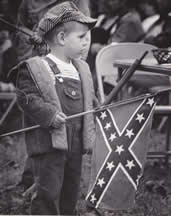
The Confederate Flag and Dixie:
“Editor of the Greenville News, Greenville, S.C.
Dear Sir,
I see great changes made every day. Nations fall, former things thought miracles are commonplace.
Heroes are toppled. The road I travel is suddenly forked into a hundred different directions. Religions
become questionable and faith a myth.
But little did I think that I should live to see the day when a group of students at the University of South Carolina
would advocate a ban on the playing of “Dixie” and the display of the Confederate Flag.
Or, that I would have ever thought it advisable to add dignity and recognition to such a movement,
by opposing it. Millions have admired and loved all that the Confederate Flag has stood for and all that
“Dixie” meant to the hearts and aspirations of a defeated people.
Only because of ignorance and misunderstanding, and a hate that has recently been engendered by those
who are capable of nothing higher, is the Confederate Flag and what it stood for, and Dixie – in thought or
words ever considered to degrade or belittle the Negroes.
The South lost greatly in its youth and the best of its men and future leaders, and its wealth, and it
has taken a hundred years to partially recover their loss. Their defeat they accepted. There remained,
however, honor, integrity, honesty, truth and God. These the South took and engraved them on their hearts
and minds and allowed the Confederate Flag to become a symbol of all the good they believed in.
Christians honor the cross, not as a fetish, not for its value, but for what it represents in their hearts.
They object to its desecration because in doing so one attempts to destroy what it stands for.
The Negro was not the cause of the Confederate War, but “The Excuse” for a war of aggression and conquest.
It has been claimed the reason, and like Hitler’s LIE – told so often, that it finally became to be thought the truth.
It seems wrong to me that the Confederate Flag and Dixie should need any defense on my part – it doesn’t.
But if I and others stand silent while this attack is being made, then our uninformed young and our ignorant
youths will think that we agree and accept this lie, and that we are ashamed to answer it. A thousand facts
and records substantiate my words.
I condemn this movement and the thoughts behind it. Out of sight are the communists who are
attacking everything that is sacred – that is right – that is true. Henry Bacon McKoy”
(Second Thoughts and Talks, Henry Bacon McKoy, 1975, pp. 63-64)
Note: Mr. Bacon was a Wilmington native
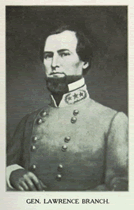
Passing of Mrs. Lawrence O’B. Branch
“Mrs. L. O’B. Branch, widow of the famous North Carolina brigadier-general who gave
his life for the Confederacy at Sharpsburg, passed peacefully away at her home in Raleigh on
November 9, 1903. Mrs. Branch had been in declining health for several months and had almost
reached the advanced age of eighty-six years.
She was the daughter of General. W.A. Blount, one of North Carolina’s distinguished men,
and her mother was the daughter of Sherwood Haywood, Esq., of Raleigh. In 1844 she was married to
Gen. Lawrence O’B. Branch, who represented his district in Congress for several terms, and during
that time his family lived in Washington City. [Gen. Branch finished his literary education at Princeton,
came to Tennessee and studied law with the eminent jurist judge, John Marshall, of Franklin.
He resided during the time with the family of his uncle, Dr. Lawrence D. G. O’Bryan.]
At the outbreak of war he went to the front and was made brigadier-general. He lost his life
while leading is brigade in the battle of Sharpsburg, September 17, 1862; and his body was
borne from the field by his faithful Negro servant, Wiley. After forty-one years of patient watching
and waiting, his devoted wife is again with him.
Mrs. Branch was a remarkable woman. She was deeply interested in contributing to the needs
of Confederate veterans and perpetuating the memory of those who gave their lives for the cause.
It was Mrs. Branch who organized the Ladies Memorial Association at Raleigh and became
its first president. For many years she remained the head of that organization,
and accomplished untold good.
The veterans in the Soldiers’ Home were frequently cheered by her presence, and loved
her dearly. The Confederate Camp in this city is named for her distinguished husband, and upon
the last memorial day, when she was unable to attend the exercises, a body of veterans visited her.
Mrs. Branch had four children: Hon. William B. Branch, ex-Congressman, of Washington, NC;
Mrs. Robert h. Jones of Raleigh; Mrs. Armistead Jones, of Raleigh; and Mrs. Kerr Craige, of Salisbury.
The funeral was attended by a large gathering of veterans, relatives and other friends, and many
affecting incidents showed the esteem in which the good woman was held. Drawn up in lines
extending from the gateway . . . were veterans from L.O’B. Branch Camp and Soldiers’ Home.
Their heads were bared, not a few with armless sleeves and wooden limbs, bearing eloquent
testimony to their valor on bloody battlefields.
The interment was in the city cemetery beside the grave of General Branch. Among the floral pieces
were handsome designs from the L.O’B. Branch Camp of Veterans, the Ladies Memorial Association,
and the Harry Burgwyn Camp. The draped colors of the Camp were sent to the residence to be placed
above the honored remains until after the funeral. The flag at the Soldiers’ Home has been
half-masted since Mrs. Branch’s death.
(The Last Roll, Confederate Veteran, May 1904, pp. 234-235)
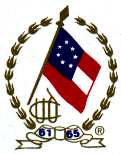
Patriotic Organizations of Greensboro
“Greensboro has members in at least 34 patriotic groups. Of these the Guilford County Chapter
of the United Daughters of the Confederacy (1899) was among the first to be active locally. It grew out
of two earlier organizations which had been dedicated to the same basic objectives – to honor the
Confederate dead and to further the ideals for which they died.
The first group – the Ladies Memorial Association -- was formed in 1866 by local women. They had
been moved by the tragedy of wounded Confederate soldiers who had been brought to Greensboro
after the Battle of Bentonville, 234 of whom, all save 4 unknown by name, had died in the homes,
churches and schools of Greensboro, and had been buried in a mass grave at the edge of town.
The [A]ssociation, under the leadership of Mrs. John A. Gretter, purchased a plot adjoining the
Methodist Church cemetery on Ashe Street and honored these dead with proper burial. Many years
later when the Eclectic Club, working with a Confederate committee, had laid the soldiers to final
rest in Green Hill Cemetery, the Ladies Memorial Association then raised to their memory a granite
monument which supports a bronze statue of a Confederate soldier.
The second group was a temporary Ladies Memorial Association of the 1880’s which joined
others in a movement to erect at Richmond, Virginia, the Battle Abbey Building, now the Confederate
Memorial Institute, and a Confederate Museum. In the latter is displayed the flag which was
presented to the Guilford Grays by Edgeworth Seminary students in the solemn service of 1860.
Both of these Ladies Memorial Associations had carried out specific purposes and then disbanded.
But the Guilford Chapter of the U.D.C. became a permanent and consistently active organization.
From its beginning in 1899 with Mrs. Frank Dalton as president it has concentrated on benevolent,
educational and historical works. In 1919 it sponsored the formation of the Lizzy Lindsay Chapter
of the Children of the Confederacy, named in honor of . . .”one of the most beloved presidents
(1913-1929) Guilford Chapter has had during its long history.”
In 1941 another adult chapter, the Annie B. Daniel, was organized; and in 1954 it sponsored the
Bertie Thompson Chapter of the C. of C. These chapters, in keeping with the State program, have
marked local Confederate graves with iron crosses, promoted a History Essay Contest in the high
schools, provided funds for needy Confederate women, and established scholarships for
descendants of Confederate soldiers.”
American Veterans
“The Guilford Camp of the [United] Confederate Veterans was active in Greensboro after the Civil War
until the last local member, G.H. Grantham, died in 1937. In 1902 this camp was host to the annual
State reunion of Confederate veterans and General James M. Ray of Asheville commented that the
Greensboro reunion was the best ever conducted and the attendance the largest of any ever held in the State.
“That city did itself proud by its lavish and generous attention to the “Old Vets,” and all in attendance will
never cease to speak well . . . of their pleasant stay.” Tents were pitched for about 1,200 in the yard
of the Eckel home, and Greensboro citizens did everything in their power to make this a memorable occasion.”
(Greensboro, North Carolina, The County Seat of Guilford, Ethel Stephens Arnett, UNC Press, 1955, pp. 317-318; 320)

Sources and Bibliography
Exhaustion of the South, David MacRae, America Through British Eyes, Oxford University Press, 1948
Copyright 2011, North Carolina War Between the States Sesquicentennial Commission